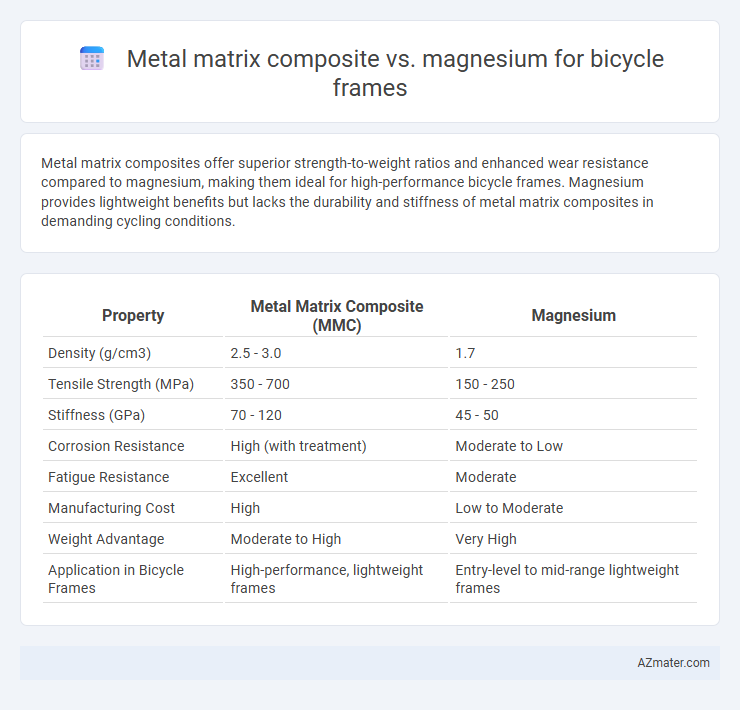Metal matrix composites offer superior strength-to-weight ratios and enhanced wear resistance compared to magnesium, making them ideal for high-performance bicycle frames. Magnesium provides lightweight benefits but lacks the durability and stiffness of metal matrix composites in demanding cycling conditions.
Table of Comparison
| Property | Metal Matrix Composite (MMC) | Magnesium |
|---|---|---|
| Density (g/cm3) | 2.5 - 3.0 | 1.7 |
| Tensile Strength (MPa) | 350 - 700 | 150 - 250 |
| Stiffness (GPa) | 70 - 120 | 45 - 50 |
| Corrosion Resistance | High (with treatment) | Moderate to Low |
| Fatigue Resistance | Excellent | Moderate |
| Manufacturing Cost | High | Low to Moderate |
| Weight Advantage | Moderate to High | Very High |
| Application in Bicycle Frames | High-performance, lightweight frames | Entry-level to mid-range lightweight frames |
Introduction: Advancements in Bicycle Frame Materials
Metal matrix composites (MMCs) offer significant improvements in strength-to-weight ratio and stiffness compared to traditional magnesium alloys, making them increasingly popular in high-performance bicycle frames. Magnesium is valued for its lightweight properties and good vibration damping but often falls short in fatigue resistance and mechanical strength. Recent advancements in MMCs incorporate ceramic reinforcements such as silicon carbide, enhancing durability and enabling designers to push the limits of lightweight, high-strength bicycle frame construction.
Overview of Metal Matrix Composites (MMC)
Metal Matrix Composites (MMCs) consist of metallic matrices reinforced with ceramic or metallic fibers, offering superior strength-to-weight ratios and enhanced stiffness compared to pure magnesium alloys. MMCs exhibit improved wear resistance, thermal stability, and fatigue performance, making them ideal for high-performance bicycle frames requiring durability and lightweight characteristics. Innovations in MMC fabrication allow customization of mechanical properties, providing a competitive edge over conventional magnesium frames in terms of structural integrity and ride quality.
Magnesium as a Bicycle Frame Material
Magnesium as a bicycle frame material offers exceptional lightweight properties, with a density approximately 35% lower than aluminum, enhancing bike maneuverability and rider efficiency. Compared to metal matrix composites, magnesium provides superior damping characteristics that reduce road vibrations, improving rider comfort on long rides. Its natural corrosion resistance and ease of recycling make magnesium a sustainable and cost-effective choice for high-performance bicycle frames.
Weight Comparison: MMC vs Magnesium
Metal matrix composites (MMCs) offer superior strength-to-weight ratios compared to magnesium, resulting in lighter bicycle frames without compromising durability. Magnesium alloys are lightweight but generally heavier than MMCs due to lower stiffness and strength characteristics. Utilizing MMCs in bicycle frames enhances weight savings, often achieving reductions up to 20% compared to traditional magnesium frames.
Strength and Durability Analysis
Metal matrix composites (MMCs) offer superior strength-to-weight ratios compared to magnesium, providing enhanced stiffness and impact resistance ideal for high-performance bicycle frames. Magnesium's lightweight nature contributes to overall frame weight reduction but typically exhibits lower fatigue resistance and durability under cyclic stress. The integration of reinforcing materials in MMCs significantly improves wear resistance and structural integrity, ensuring greater longevity and reliability for demanding riding conditions.
Ride Quality and Comfort
Metal matrix composites (MMCs) offer enhanced ride quality and comfort compared to magnesium due to their superior stiffness-to-weight ratio and vibration damping properties. The tailored fiber reinforcement in MMCs reduces road vibrations, resulting in a smoother ride over rough terrain. Magnesium frames, while lightweight, tend to transmit more vibration, leading to a less comfortable riding experience over extended distances.
Corrosion Resistance and Longevity
Metal matrix composites (MMCs) offer superior corrosion resistance compared to magnesium, as MMCs typically incorporate ceramic or other corrosion-resistant reinforcements that protect the matrix from oxidative degradation. Magnesium frames are more prone to corrosion due to their high reactivity with moisture and environmental elements, which can significantly reduce their longevity without proper coating or treatments. The enhanced durability of MMC bicycle frames translates to longer service life and reduced maintenance needs, making them preferable in environments with high exposure to humidity or corrosive conditions.
Manufacturing Processes and Costs
Metal matrix composites (MMCs) for bicycle frames involve advanced manufacturing processes such as powder metallurgy, stir casting, and infiltration, which require specialized equipment and higher energy consumption, leading to increased production costs compared to magnesium frames. Magnesium frames are typically produced through more conventional methods like die casting and extrusion, which offer faster cycle times and lower material costs but may compromise on the tailored mechanical properties achievable with MMCs. The complexity of MMC manufacturing results in superior strength-to-weight ratios and fatigue resistance, yet magnesium bicycles are often favored for cost-sensitive markets due to more economical fabrication and material availability.
Environmental Impact and Sustainability
Metal matrix composites (MMCs) in bicycle frames offer superior strength-to-weight ratios and enhanced durability compared to traditional magnesium alloys, reducing the need for frequent replacements and thus minimizing lifecycle environmental impact. Magnesium, while lightweight and abundant, poses recycling challenges and has a higher carbon footprint due to energy-intensive extraction and processing methods. Sustainable bicycle manufacturing favors MMCs with optimized recyclability and longer service life, significantly lowering overall ecological footprints linked to material sourcing and end-of-life management.
Conclusion: Choosing the Optimal Frame Material
Metal matrix composites offer superior stiffness, wear resistance, and fatigue life compared to magnesium, making them ideal for high-performance bicycle frames demanding durability and rigidity. Magnesium frames provide significant weight savings and excellent vibration damping, enhancing rider comfort and agility. Selecting the optimal frame material depends on balancing performance priorities: metal matrix composites suit competitive racing, while magnesium favors lightweight, casual riding.

Infographic: Metal matrix composite vs Magnesium for Bicycle frame
 azmater.com
azmater.com